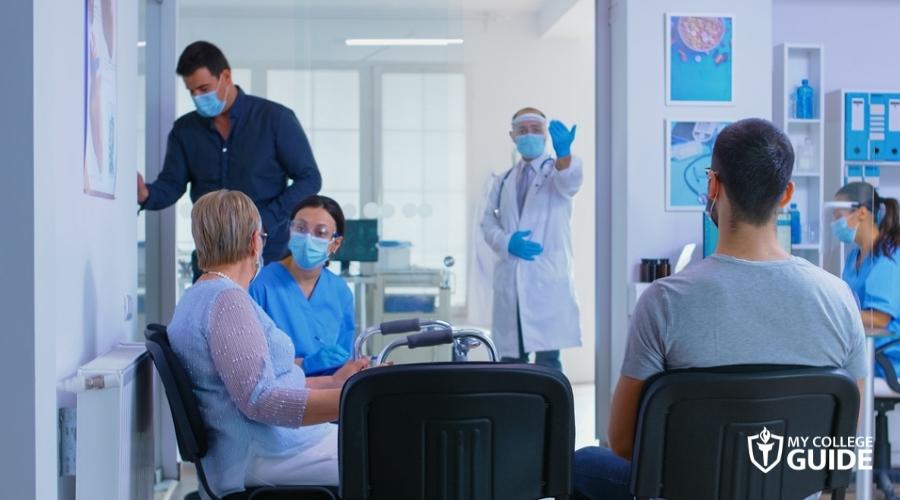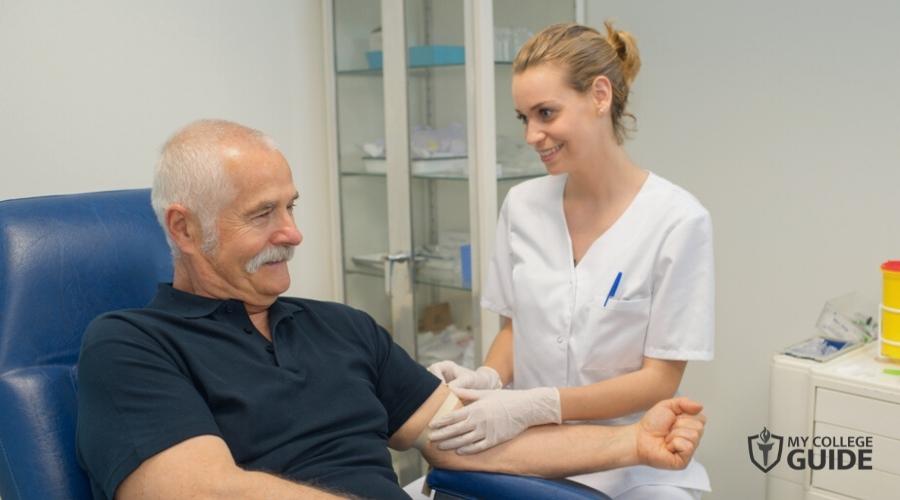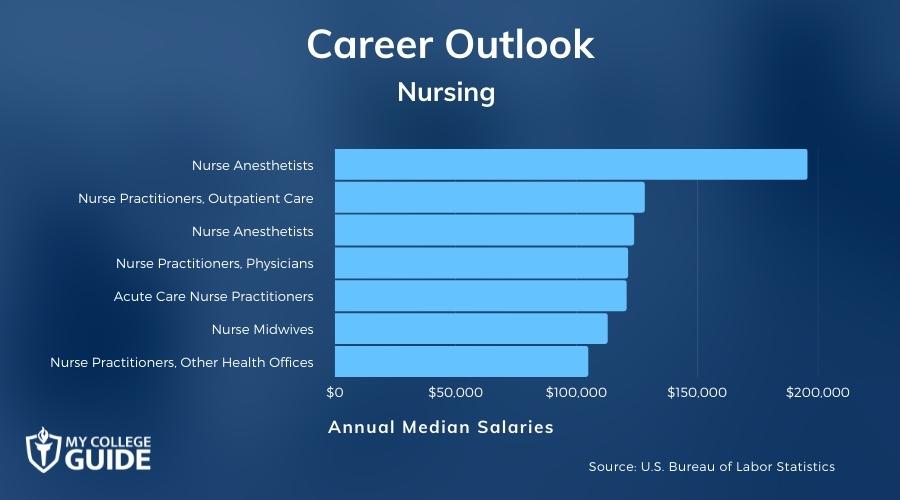Nursing is a popular degree program for those who want to help people, and the varied nursing career paths offer a wide range of specialized subfields.

If you have a passion for helping others and are excellent at staying cool under pressure, you can pursue a rewarding career in the nursing field after completing one of the many degree program options.
Editorial Listing ShortCode:
A nursing degree allows you the opportunity to work in a hospital, doctor’s office, school, and other places where medical help is required.
What Can You Do With a Nursing Degree?

A nursing degree opens up a lot of opportunities. Whether you want to work in administrative and leadership roles or directly on the floor with patients, there are countless options to customize your nursing degree to a specific concentration.
Nursing is a well-paying career, and that is one of the major draws for students looking into their educational options. You can start your career as an entry-level nursing assistant. According to the U.S. Bureau of Labor Statistics, nursing assistants can earn an annual median salary of $30,310.
Editorial Listing ShortCode:
If you would like to help patients directly with their medical care, you could consider being a registered nurse. Registered nurses earn an average of $76,700. If you enjoy diagnosing patients, perhaps a family nurse practitioner is the right path for you, with the opportunity to earn $121,280.
Nursing offers many career options. It is important to note, that you may make more or less than the salaries above based on your nursing certifications and experience level.
Entry Level Careers with a Degree in Nursing
Those who have earned their degree in nursing are often considered “entry-level” nurses because they are still learning and growing within their profession. There are many careers in nursing appropriate for entry-level nurses, including the following:
1. Certified Nursing Assistant (CNA)

Certified nursing assistants often report to a licensed practical nurse (LPN) or a registered nurse (RN). They provide care assistance, including bathing, helping patients eat, dressing, and taking care of basic daily activities.
CNAs frequently receive their certification in order to work in the nursing field while they continue their educational path. That way, they can have a deeper understanding of the nursing profession while practicing basic care for patients.
2. Licensed Practical/Vocational Nurse (LPN or LVN)

The terms “licensed practical nurse” and “licensed vocational nurse” are often used interchangeably. Typically, these nurses report to registered nurses or doctors and offer basic support to patients.
They may help patients care for themselves, provide medications, help at meal times, and take vital signs regularly. Many are employed at nursing homes, hospitals, and doctor’s offices, or provide home health care.
3. Registered Nurse (RN)

Registered nurses interact with patients a great deal, coordinating intake information, taking vital statistics from patients, and providing them with care notes and additional education regarding their visit or current medical situation.
RNs can provide wound care and assist with medical procedures. As a result, they often pursue additional education in order to be state licensed in their area of expertise.
4. Medical Assistant

Medical assistants work primarily in the office or administrative side of a medical practice. While they may not interact with patients in a care setting, they interact with patients assisting physicians and providing further education.
In this role, it is important to understand medical terms, as well as be able to clearly explain any doctors’ notes to patients allowing. This position allows entry-level nurses can practice their terminology.
5. Phlebotomists

A phlebotomist is a trained technician who works specifically to draw blood from patients. They may take blood samples for medical testing, or for the purpose of blood donation.
In most states, phlebotomy technicians are asked to complete a certification program before they are able to work professionally. As a result, many nursing students earn their certificates as they are completing nursing school to earn experience in the field.
Editorial Listing ShortCode:
Entry-level nurses often work under the guidance of advanced nurses to help them learn and grow within their new careers.
Advanced Practice Registered Nursing (APRN) Careers
As you gain experience and feel more confident in your nursing skills, you may make a professional and educational decision to work towards an advanced practice registered nursing career.
Frequently, these types of nursing jobs are available to students who have completed additional schooling and have significant experience in nursing.
1. Certified Nurse Midwife (CNM)

Certified nurse midwives are specialists in caring for women and babies during the birth process. They have gynecological training in addition to primary health training and can provide a variety of medical services and comfort to expecting mothers.
Generally speaking, CNMs are involved with all aspects of pregnancy, helping prepare for the arrival of the new baby, as well as providing care for the baby and mother throughout the postpartum period.
2. Nurse Practitioner (NP)

A nurse practitioner is able to practice in a similar capacity to a doctor. They have often received significant school and have a great deal of experience. They can specialize in a particular field, such as gastroenterology or orthopedic health.
NPs can prescribe medication, order scans and x-rays, and coordinate outpatient health treatments.
3. Clinical Nurse Specialist (CNS)

Clinical nurse specialists are often found in settings where patients are being treated for chronic conditions, or in a specialized setting, such as a nursing home or emergency room.
CNS professionals are responsible for helping patients understand their condition, and help answer questions regarding their current care or long-term treatment plans.
4. Nurse Anesthetist (CRNA)

Nurse anesthetists work directly with doctors and anesthesiologists throughout surgical processes, or procedures in which the patients are under anesthesia or sedation. They help stabilize patients and keep an eye on vital signs.
CRNAs may also provide care for patients before and after their procedure to ensure there are no concerns or potential problems.
5. Family Nurse Practitioner

A family nurse practitioner works alongside a general practitioner, also known as a “family doctor.” As a result, family nurse practitioners often interact with seniors, adults, children, and infants.
Editorial Listing ShortCode:
These nurses are able to provide thorough examinations, make diagnoses, and provide care and treatment plans for their patients. They can also provide health education and lifestyle recommendations. These are just a few of the nursing career paths available to those who have received their APRN designation, as there are many potential careers for RN.
Specializations & Alternative Careers for Registered Nurses

Just as there are many types of doctors, there are many types of nursing specialties. These can involve working on particular areas of the body, certain conditions, or working outside of the typical “doctor’s office” setting.
- Oncology Nurse: In this specialization, nurses focus on providing care for cancer patients. This may include education regarding different treatments, as well as keeping updated health records.
- Developmental Disability Nurse: These nurses are specifically trained to work with individuals with a variety of developmental issues. They are specifically trained to recognize complications or concerns stemming from a patient’s disability.
- Neonatal Nurse: These nurses work with premature babies. They often work within an intensive care unit or special care unit.
- Pediatric Nurse: Nurses who work with children are trained to treat injuries and illness, as well as recognize signs of potential developmental or growth issues.
- Cardiac Nurse: In this profession, nurses work with patients with heart concerns. They may assist in surgical procedures, and provide education and information for patients.
- Critical Care Nurse: Nurses trained in critical care are experienced with emergency procedures and lifesaving techniques. They often care for patients with serious wounds or medical concerns.
- ER Nurse: These nurses work in the emergency room, helping with triage, taking vitals and intake information, and providing urgent care for patients in life-threatening situations.
- Public Health Nurse: These nurses work with the public, typically in a clinic or urgent care situation. They provide care and education, often for underserved populations.
- Trauma Nurse: Similar to ER nurses, these nurses offer care and support for individuals who have suffered serious and traumatic injuries, including car accidents or industrial injuries.
- Psychiatric Nurse: Typically employed at a rehabilitation center, hospital, or care home, these nurses provide not only physical support by helping administer medications and medical care but through education and emotional support.
- Perioperative Nurse: Also known as an OR Nurse, these professionals provide pre and post-surgical care for patients, including changing dressings, administering medication, and setting up the recovery room.
- Nurse Educator: In this role, nurses work with a population to provide them with education regarding a variety of medical and health concerns. They may work at schools or in community clinics to educate the public regarding specific conditions or procedures
- Nurse Manager: This individual serves as the manager for a team of nurses, typically at a hospital or large medical facility. They often oversee nurse rounds, review patient records for accuracy, and tend to urgent situations that may arise.
- Nurse Administrator: This role is above that of a nurse manager, in that administrators oversee all nurses in a particular unit or facility. They often prepare analytical reports regarding procedures and aggregate patient data, as well.
- Nurse Case Manager: These individuals may work as coaches for chronic patients, or within a disease management capacity to help patients track their progress or concerns regarding a specific medical situation, such as pregnancy or chronic illness.
- Travel Nurse: These nurses often work in a contract with a hospital or practice to provide care to patients who are unable to receive care at the actual facility. They may travel within a specific city, or throughout the state for days or weeks at a time, depending on their contract.
- Perianesthesia Nurse: This is a very specific type of nurse who monitors patients who are coming out of anesthesia. They ensure patients awaken safely and examine them for signs of distress before allowing them to be discharged or moved to another part of the hospital or care facility.
- Pain Management Nurse: These nurses are often the patient’s first point of contact when experiencing significant pain. They review symptoms, as well as potential causes and effects to help doctors understand the scope of the situation before making a diagnosis.
- Nurse Attorney: This is a unique career field that combines both legal and medical knowledge, which can be beneficial to both fields. Legal training and passing the bar exam are often required in addition to a nursing license.
- Legal Nurse Consultant: These professionals work in conjunction with legal teams to provide insight into cases that are related to medicine or the medical field. They may analyze data provided to them by a legal team, or interact with patients directly.
- Health Policy Nurse: Another alternative career, these nurses use their medical insight to review, recommend, and amend existing health-related policies.
- Chief Nursing Officer: This is an executive-level role for individuals who oversee the policy, procedures, and performance of the entire nursing staff. They usually have experience in leadership as well as extensive nursing training.
- Nurse Advocate: These professionals work to help patients and providers connect to make important decisions regarding care or treatment. They help patients and doctors communicate clearly while ensuring patients’ rights are not violated.
- Certified Dialysis Nurse: These nurses work in a kidney dialysis practice, helping patients before, during, and after their treatment. They are experienced in nephrology and can assist with patient education to ensure that patients understand their condition, possible complications, and when to express concern.
- Nurse Researcher: These individuals often work in a lab or experimental setting. They review and annotate research and analysis from a medical standpoint, and ensure records are kept up to date with all new findings and notes.
- Pediatric Endocrinology Nurse: There are many very specific care situations, including the health of reproductive body parts and the hormonal changes of children. These nurses educate young people regarding their development.
- Informatics Nurse: In this role, professionals provide medical care providers with health care statistics and analytical information to help them review and maintain patient records. They also offer training on informatics applications.
- AIDS Care Nurse: These nurses provide care to individuals living with HIV/AIDS, as well as their partners and family members. They also provide outreach to schools and communities regarding HIV/AIDS awareness and prevention methods.
- Ambulatory Care Nurse: In this role, nurses work with patients who have urgent but less severe issues, such as chronic disease flare-ups or illnesses that do not require hospitalization. They often work at care centers or urgent care clinics with patients who are feeling unwell or need a specific type of treatment for conditions such as asthma.
- Certified Life Care Planners: These professionals work with individuals who have conditions that ultimately leave them unable to care for themselves. They help develop treatment and care plans to the patient’s specifications and based on medical recommendations.
- Nurse Trainer: This is the professional who trains nurses. They may work at a community college, university, or another institute of higher learning. As such, they are trained in both nursing and may also have an advanced degree in education.
- Charge Nurse: This is the individual who serves as the “lead” nurse in a unit or care facility. They are not only responsible for the care of patients, but for coordinating the nursing staff by assigning patients, duties, and compiling records and reports.
- Flight Nurse: These nurses are responsible for keeping patients stable during air transportation. In many cases, these are very urgent medical situations that need emergency care before, after, and during the flight, which can be complicated by the flight process.
- Forensic Nurse: These nurses work with police and other law enforcement figures to provide evidence on behalf of victims of various crimes, such as child abuse and sexual assault. They may also work with the victims themselves.
- Genetic Nurse: As genetic testing becomes more advanced, these nurses help test patients for hereditary conditions such as Alzheimer’s or types of cancer. They also help couples learn of the potential genetic risks of reproduction.
- Home Health Nurse: These individuals see patients who can no longer fully take care of themselves, but still live in their homes. They often work alongside a doctors’ practice or medical group to ensure patients receive medications, are able to get dressed and bathe, as well as arrange meals and help with chores.
- Long-Term Care Nurse: For patients who need care for an extended period of time, a long-term care nurse can help with daily functions and regaining independence. These patients often have rehabilitation needs, as well as issues specific to those spending a prolonged amount of time in a hospital or care facility.
- Occupational Health Nurse: This is another alternative career, in which a nurse is employed by a business to assist in preventing and treating workplace injuries. They may also provide education regarding various health conditions, and make recommendations for ergonomic changes or potential health risks to workers.
- Otorhinolaryngology Nurse: These nurses focus specifically on conditions that impact the ear, nose, mouth, and throat. They often provide treatment for common childhood diseases and infections, as well as provide treatment for breathing and hearing issues.
- Radiology Nurse: In this role, nurses assist patients who are having x-rays or scans done, such as MRIs, CT scans, and other types of imaging to help diagnose a specific condition or injury. They may also assist in providing radiation therapy to individuals who are fighting certain types of cancer.
Typically, those who pursue specialized types of nursing jobs have chosen a concentration through their degree program and licensure to prepare them for these professions.
Nursing Careers & Salaries

From entry-level nursing positions in a hospital setting to owning your own practice as a nurse practitioner, there are many ways to utilize a nursing degree to begin the journey to a well-paying career.
Editorial Listing ShortCode:
Below is a list of the top 40 nursing careers & salaries, according to the U.S. Bureau of Labor Statistics (BLS), to give you an idea of what to expect after graduation.
| Careers | Annual Median Salaries |
| Nurse Anesthetists | $195,610 |
| Nurse Practitioners, Outpatient Care | $128,190 |
| Nurse Practitioners, Physicians | $121,280 |
| Acute Care Nurse Practitioners | $120,680 |
| Nurse Midwives | $112,830 |
| Nurse Practitioners, Other Health Offices | $104,790 |
| Adult Nurse Practitioners (ANP) | $103,371 |
| Nurse Anesthetists, Educational Services | $102,680 |
| Nursing Service Directors | $101,340 |
| Healthcare Managers, Outpatient Services | $99,540 |
| Nursing Managers, Physicians Office | $98,230 |
| Nursing Instructors and Teachers, Hospitals | $95,720 |
| Nursing Managers, Residential Care Facilities | $83,550 |
| Healthcare Diagnosing Practitioners | $81,270 |
| Nursing Teachers, Junior College | $79,810 |
| Registered Nurses, Hospital | $78,070 |
| Clinical Nurse Specialists | $77,600 |
| Nursing Teachers, Postsecondary | $77,440 |
| Nursing Instructors, Trade Schools | $77,010 |
| Registered Nurses, Ambulatory Services | $76,700 |
| Medical Sonographers | $75,380 |
| Registered Nurses, Healthcare Facilities | $72,420 |
| Nutritionists | $61,650 |
| Dieticians, Residential Care Facilities | $60,840 |
| Cardiovascular Technologists | $60,570 |
| Medical Journalists | $48,370 |
| Licensed Vocational Nurses | $48,070 |
| Health Technicians | $46,910 |
| Licensed Practical Nurses, Physicians Office | $46,870 |
| Christian Science Nurses | $37,500 |
| Clinical Medical Assistants | $37,190 |
| Hospital Nursing Assistants | $35,870 |
| Nursing Assistants | $30,310 |
| Nursing Orderlies | $30,290 |
| Nursing Care Facilities Nursing Assistants | $29,970 |
| Assisted Living Facility Nursing Assistants | $29,900 |
| Paramedic Nursing Assistants | $29,620 |
| Dietary Aides | $29,520 |
| Nursing Assistants, Home Healthcare | $29,280 |
| Physical Therapy Aides | $29,200 |
Please keep in mind that some employers look for a minimum of a bachelor’s degree to be considered for a few of these positions but this list can jump-start some career ideas for you.
Skilled nurses are always in high demand, and the career outlook for nursing careers exhibits positive overall trends. Across all fields of healthcare, the BLS projects that there is going to be a 13% growth rate within the field over the next 10 years.
Editorial Listing ShortCode:
Registered nurses are expected to see an employment growth of 6 percent over the next 10 years. Alternatively, nursing assistants and orderlies employment is projected to grow 5 percent over the same time period adding around 200,000 new jobs yearly.
Nurses are the first line of treatment in the medical world and play a vital role in the quality of care patients receive. From hospital staff nurses to independent nurse practitioners, there is a world of opportunity available to students ready to take on the respected and rewarding field of nursing.
What Qualifications Do You Need to Become a Nurse?

Since there are many nursing career paths, there are also many different ways to become a nurse. In order to be considered a licensed practical nurse (LPN), you’ll be asked to complete an accredited licensing program. Registered nurses (RNs) must complete their Bachelor of Science in Nursing (BSN) to qualify.
Those wishing to become advanced practice registered nurses (APRN) are typically asked to complete an MSN, or Master of Science in Nursing. This is where many students decide upon their chosen specialties in nursing. In many cases, nursing specialties include education and experience in the specialized field. For example, an oncology nurse learns about different types of cancers and treatments.
Licensing requirements vary between states, but in most cases, you may be asked to sit for an examination as part of the licensing process. Depending on where you live, you may also sit for a state exam or the National Council Licensure Examination (NCLEX) for nurses.
What Is a Nursing Degree?

The field of nursing is a challenging, hands-on field that depends on professionals with strong critical thinking skills and the ability to work under pressure. There are several paths to becoming a nurse, including hospital and college-based degree programs.
A basic registered nurse degree requires a similar amount of schooling as an associate’s degree. However, with the competitive job market, the majority of RNs go on to earn a bachelor’s degree in nursing. There are advantages of earning a BSN vs. ADN. After achieving your RN license, there are several options for master’s or doctorate programs that can provide additional training in specialized skills for upper-level job opportunities.
Editorial Listing ShortCode:
When working toward a degree in nursing, there are several stages to successfully completing the program and earning your license, including:
- In-depth courses on nursing theory and ethics
- Skill labs for hands-on training
- On-site training at a medical facility
- Successful completion of the NCLEX examination
Due to the nature of the nursing degree field, you must complete your basic RN license through an in-person degree program. If you are already an RN looking to work towards an advanced degree, there are several online nursing programs that allow you to continue working while pursuing advanced education.
What Does a Nurse Do?

Nurses wear many hats, regardless of their specialty or place of employment. Not only do they provide comfort, medication, and assistance to patients, but they are usually tasked with keeping detailed patient history reports. They may treat wounds, change dressings, take blood samples, and make sure medical equipment is functioning properly.
They may also work as educators, helping patients and families understand their condition, prognosis, and scope of care. In alternative settings, nurses frequently may work as advocates for the population they serve, connecting vital medical information to individuals who need it most.
Where Do Nurses Work?
When most people think of what nurses do and where they work, they often think immediately of hospitals and doctor’s offices. But depending on a nurse’s specialization, they can work in many different places.
Some choose to work in correctional facilities to provide care for inmates and those who are working towards a new future. Other nurses work in schools and universities to provide health education, disease prevention, and the occasional accident.
Editorial Listing ShortCode:
Many nurses also work in an office setting. Nurses can coordinate with legal and corporate firms to provide medical and health advice pertaining to workers and their rights.
Getting Your Nursing Degree Online

There are many available professions in nursing, making it a fascinating field for many students. From the traditional occupation of caring for patients in a hospital to the many nursing specialties to working in an alternative medical career, there are many potential careers for RN.
If you find yourself drawn to a particular field or specialty, it may be time to consider pursuing further education in nursing. Fortunately, there are many areas to explore and options to consider when getting started.
If helping others is what you like you do, you may want to take a look at some of the programs here to take your first step toward a potential career as a nurse!
You can also view our Careers in Math and Careers in Nutrition guides for more options.
